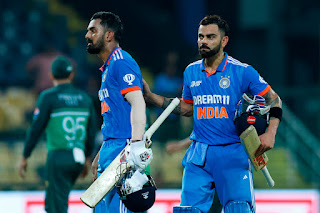What’s behind India’s thumping win over Pakistan?
By K.R. Nayar
After numerous hurdles, finally the much-awaited the India-Pakistan match was played. While India needed clearance from their government on where they could play, the other obstacle was clearance from the weather. Weather, however, proved stronger than political decisions. Rain played spoilsport continuously, and the clash between these two teams did not take place.
 |
| The batters KL Rahul and Virat Kohli that shattered records. Photo: ACC |
But once everything fell into place, the question then was not whether they would produce good cricket but who would win. For fans of both countries, only one thing matters, and that is their country should win. Be it a 50-over match, a T20 contest, or a Test match, it has been the same over the years. Hence, tickets are sold out like hotcakes, hotel rooms are booked way in advance, and it is said some fans have checked into hospitals in order for them to stay and watch the clash between these two teams in the World Cup due next month.
 |
| Captains Rohit Sharma and Babar Azam before the toss |
Then once the match starts, the question is whether the star players will deliver? Team ranking or recent performances do not matter. Who will shine on the day? Which team will do most things correctly, and who will not get things right that day? On September 11 in Colombo, during the Asia Cup Super Four match, Team India did everything brilliantly, and Pakistan failed to lift their game.
Losing the match after winning the toss is
unpardonable, especially after letting India bat first. Pakistan let two Indian
batters get half-centuries and another two to hit unbeaten centuries. India's
task was made easy by Virat Kohli, while KL Rahul silenced everyone with a
knock that hit his critics hard.
When the best Indian batsmen sparkled, Pakistan's best bowlers, who had
received praise after the washed-out match, failed miserably. India won by 228
runs, which is India's highest margin of victory against Pakistan by runs.
 |
| Kuldeep Yadav... deadly five-wicket haul |
So, who won the match for India? Yes, it was their batters who posted an imposing total. But the man who forced Pakistan to lose miserably was India's left-arm wrist spinner Kuldeep Yadav. How did Pakistan batters, known for being excellent players of spin, surrender five wickets to him? It seemed like they did not remember that it was Yadav, during the 2018 Asia Cup held in the UAE, who won the Cup for India by becoming the highest wicket-taker for India in the series. Yadav had started playing cricket wanting to be a pacer like Pakistan's Wasim Akram until his coach changed him into a spinner!
After the defeat, Pakistan skipper Babar Azam said,
"We lost back-to-back wickets and couldn't build partnerships." This
is where India excelled. Virat Kohli and KL Rahul's unbeaten partnership of 233
was the highest for any wicket in an ODI Asia Cup, surpassing the 224-run
opening partnership between Pakistan's Mohammad Hafeez and Nasir Jamshed
against India in 2012.
When Pakistan began their chase against a record
partnership, they should have aimed towards setting up another record if they had to
win. Unfortunately, their highest partnership was a mere 30 runs between Fakhar
Zaman and Agha Salman.
India's win can be a big blow to all departments of
Pakistan's game. They will need to get back stronger mentally to recover from
this heavy defeat.
Brief Scores: India bt Pakistan by 228 runs. India 356 for 2 in 50 overs (Rohit
Sharma 56, Shubman Gill 58, Virat Kohli 122 not, K L Rahul 111 not out)
Pakistan 128 in 32 overs (Fakhar Zaman 27; Kuldeep Yadav 5 for 25).
Player of the Match: Virat Kohli



Comments
Post a Comment